“In all fairness, with West Australia, South Australia, and Victoria, we are the fourth footballing state of Australia,” said Robert Shaw, after coaching the 1990 Tasmanian State of Origin Team to a tantalising win over Victoria.
This was their first in 30 years, and only their second in over a century. Since that game, talks of a Tasmanian AFL team have increasingly grown, with multiple proposals that are continually knocked back by the AFL.
Tasmanians are usually left with a glimmer of a hope when they are told “not right now”, and “eventually”. So after years of pushing for a team, will they get to see a local team formed in the near future?
Or will the complications of starting a new team be too much to handle for the league, especially after a pandemic?
The ongoing battle
The ebbing and flowing battle for a Tassie team has been a long one. It officially began in the mid-90s, when a 30,000 capacity, $34 million stadium was proposed to be built in Hobart’s showgrounds.
This ground was to be used by a Tasmanian team had the AFL approved their bid, but it was denied when Fremantle and Port Adelaide were granted entry into the competition.
In 2000, the state-wide Tasmanian Football League was disbanded, resulting in the Tasmania Devils being formed and entering the VFL in the following year. The team had a fair amount of support from local fans, but eventually withdrew from the competition to restart their own state-wide league in 2008.
In 2008, Gold Coast and Greater Western Sydney were nominated as the next two expansion teams to enter the AFL. Tasmania then launched another bid, with full backing of the state government and confectionary company Mars committed to being the team’s major sponsor.
But Andrew Demetriou, the AFL CEO at the time, ultimately denied the request.
With a lack of talent pathways and no AFL team to root for, local football participation in Tasmania had been declining. In 2018, AFL CEO Gillon McLachlan addressed the “fractured and fragmented” landscape of Tasmanian football, and announced the recommendations to rebuild the sport in the state.
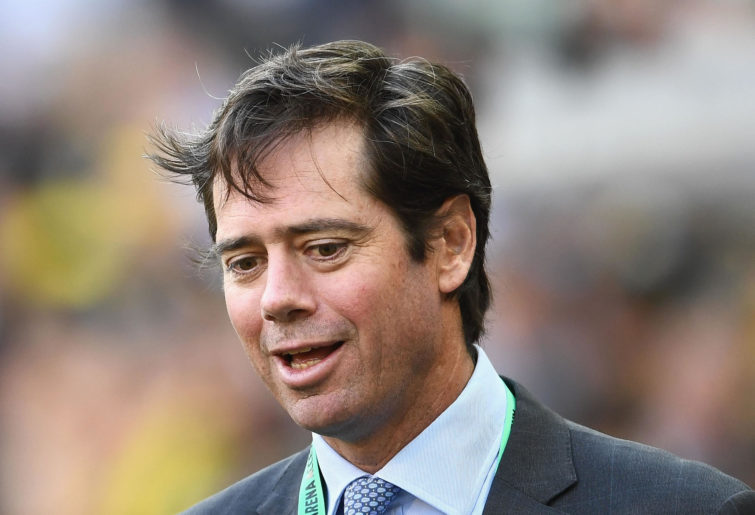
Gillon McLachlan (Photo by Quinn Rooney/Getty Images)
In the following year, the Tasmanian Devils would join the NAB League, an under-19 representative competition where players are often drafted to the AFL from.
In 2019, the AFL had set the Tasmanian government guideline requirements to house an AFL team. A task force made up of Australian business people was put together later that year to help meet these requirements and make the push for a team. Errol Stewart, a member of the task force, says he is aware that starting a new team won’t be easy.
“No one’s going to make any illusion that this is going to be an easy exercise. We are going to have to be right on our toes, with a fantastic administration to be successful,” he says. “Ultimately, no one says it’s going to be easy to start up a club that can’t win a game and can’t make any money.”
“But to run a club that’s financially stable, has a good administration and has a long-term prospect of playing in finals, that’s a considerable task. And I certainly don’t underestimate it.”
As a heartland state of the sport, the Tasmanian government has made multiple deals with AFL teams to play games on the island. North Melbourne and Hawthorn currently play in Hobart and Launceston respectively.
Tasmanian Premier Peter Gutwein, a strong advocate for a state team, earlier this year issued an ultimatum to the AFL, reportedly refusing to negotiate extension of the North Melbourne and Hawthorn contracts until the AFL provided a firm timetable for the introduction of a Tasmanian team.
The AFL rejected the request, stating that COVID-19 had made it too financially risky.
Perceived challenges
Many arguments have been made against the proposed Tasmanian AFL team, which can sometimes be perceived as more problematic than they actually are.
For the team to be approved, 75 percent of AFL club presidents and AFL commission need to be in agreement when it comes to allowing the team to enter the competition. There are recurring challenges that are often mentioned, which are stopping Tassie from entering the league.
More money has to be shared
The AFL club presidents have been hesitant to agree to another expansion team because they assume they would be losing out on money. If another team is added to the competition, that means the revenue that is generated has to be shared to an extra club.
“I’m positive that if the teams sat around the table, and one said ‘I’m going to relocate to Tasmania’, the other 17 teams would say ‘what a terrific move,'” Stewart says.
“When you’re looking at an extra team, though, coming into the competition, some of the presidents would say ‘what’s going to happen to the money that I would previously get, which I’m not getting now because of Tasmania?’”
But what isn’t being considered is that more teams can mean more games to be played, and also more broadcasting rights – and broadcasting to a whole new state will most likely mean a lot more revenue is generated.
Corporate support
There is the thought that a Tassie team won’t have enough corporate support to be able to maintain a successful team in the league. Tasmanian Football Board chairman Jim Wilkinson says the argument that there aren’t enough Tasmanian-based companies to sponsor the team is invalid.
“It’s a fallacy, because you have a look where other clubs in the AFL are getting their sponsorship, they’re getting some from interstate and some from overseas,” he says. “When you’ve got Collingwood who have a huge sponsor in Emirates, their head office is in Dubai, it’s not downtown Collingwood. So that just doesn’t fit.”
Furthermore, the previous commitment of Mars sponsoring a Tassie team has proven that the team would certainly be able to find sponsorship, especially in a league as renowned as the AFL.
Julie Kay, another member of the task force, says their team would be able to primarily support itself when it is up and running.
“The fact that the state government is committed to ensuring that we don’t become a burden on the AFL, I think that’s important,” she says.
“We would not be expecting the amount of resources that the AFL are giving to the Gold Coast, we would be mid-range like a number of other clubs.”
Need for a 20th team
Some think that if a nineteenth team is added to the league there will have to be a twentieth team added on top in order to avoid byes. Wilkinson says that although he would like to see a twentieth team added as well, it wouldn’t be necessary as byes have always been a part of the league – and still are.
“There was an odd number for a number of years when Adelaide first entered the competition, so an odd team shouldn’t make any difference, it’s only an excuse to be used if people want to find excuses and other ways around it,” he says.
The potential of a Darwin-based team has also been discussed, in an attempt to make the AFL a fully national league.
Non-captive market
The AFL has been hesitant to expand into Tassie because they don’t believe there would be enough exposure to be gained in a state that is already footy-focused.
This is why their most recent expansion teams were into the rugby states of Queensland and New South Wales. Wilkinson says that because the state is full of footy fanatics, their own team would be fully backed and would only make the sport more prominent.
“The whole state, then, would become even further passionate about football. Because Tassie support their own, and they support their own fiercely,” he says.
It is likely that a team would find supporters. It has been reported that Tasmania already has approximately 90,000 members linked to current AFL teams, and previous expansion teams have been in the already-football states of South Australia and Western Australia.
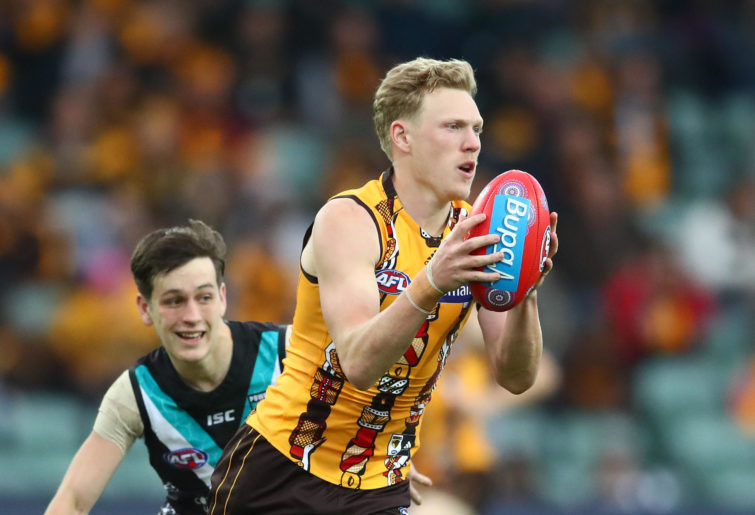
The Hawks and the Power play in Tasmania. (Photo by Scott Barbour/Getty Images)
Where the team will be based: North-South divide
Tasmania’s north-south divide between Launceston and Hobart residents has been seen as a potential problem for finding supporters, but a whole-state team may be a catalyst for unifying the island.
“What we have to do is get the whole state talking as one as best as we can,” Wilkinson says.
“We need to make sure that the team is a Tasmanian team, not a Launceston team, a Hobart team, or even a Devonport team. It has to be the whole of Tasmania and that’s the way it will get its best support.”
The task force proposed that the team would solve the problem by playing games in both of Launceston and Hobart, but would primarily be based in Hobart, and that both arenas would receive upgrades. Stewart says this is the ideal way to expose the sport to children from both sides of the state.
Real challenges
There are some more prominent challenges Tassie will have to face if they are to bring in a new team, and they will have to be accounted for as best as they can.
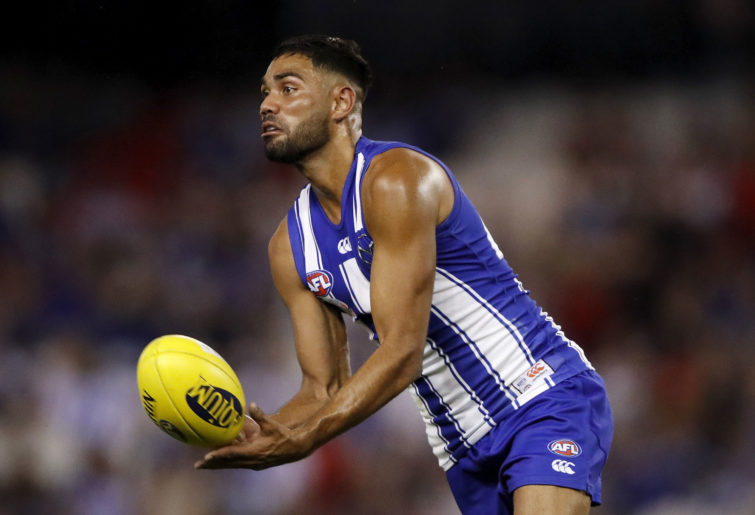
Tarryn Thomas is a Tasmanian AFL player. (Photo by Dylan Burns/AFL Photos via Getty Images)
Player retention
Being able to retain players once they are drafted will be one of the biggest challenges for Tasmania. We already see it quite often in the AFL, when players tend to return to their home states after being drafted to an interstate team. Wilkinson says the state will try to create more jobs and courses for players when they retire, and hopes it can provide a good home for its players.
“Hopefully because Tasmania is a close-knit community, if people came down here to play, it would be more than just football that they would benefit from. Hopefully they would benefit for a life after football as well,” he says.
Diluted talent pool
In any sport league, adding expansion teams means the talent pool for potential players becomes more diluted. This has been a worry for AFL commission as they want to keep their product to a high standard.
Lack of participation
The decline in footy participation on the island has led to a lack of Tasmanians being drafted to the AFL and has been a hindrance to the justification of getting a team.
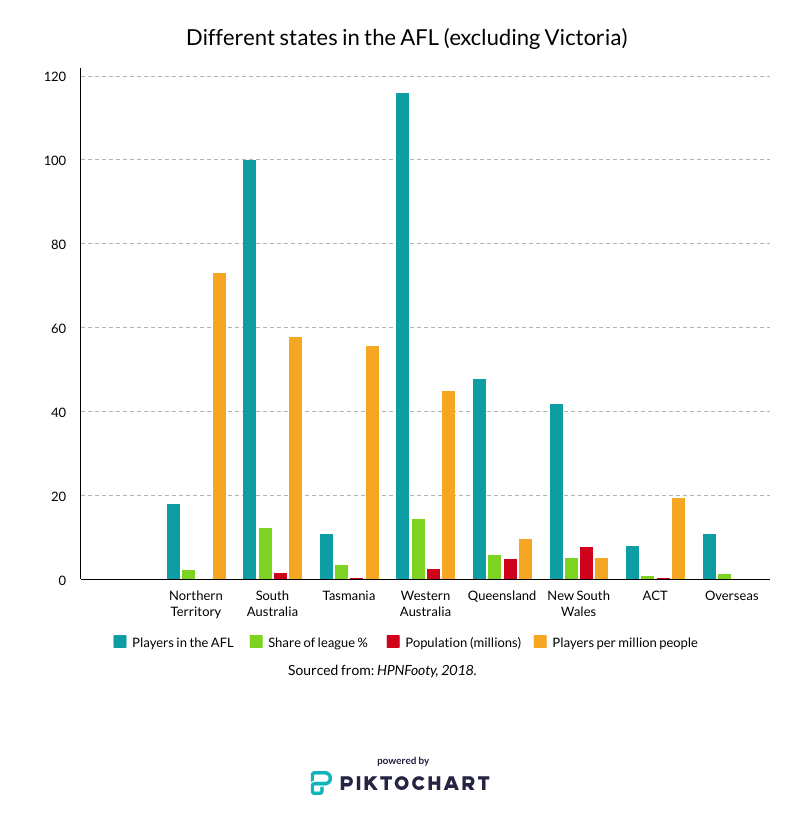
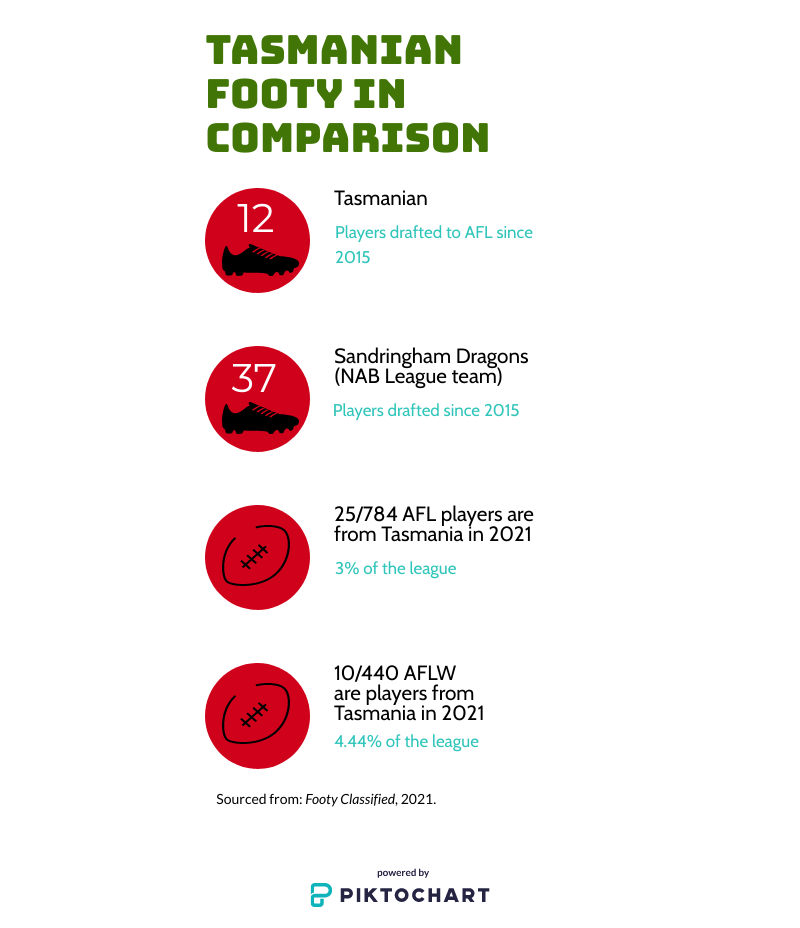
Stewart argues that having a team in the AFL would create more talent pathways and inspire children to play the sport more.
“The end game is to drive participation up for young children into sport in general, and for them to have a desire to succeed into a senior level of football,” he says. “That’s the end game and clearly we believe that having a licence to play in a big league encourages, very much, that participation.”
As a state so eager to have a team, that has been fighting the battle for a long time, it only makes you want to root for them. The benefits seem to outweigh the cons when looking at the bid as a whole, whether it be from helping football dominate the Australian sport scene more than it already does, or the potential financial gain for everyone involved, a Tasmanian team would be an intriguing inclusion into the AFL.
“We are part of the footy community, so we should be part of the AFL competition,” Wilkinson says.
“It’s their party, we’ve got to be invited to it. So it really is up to them, but all we can do is be ready when and if we are given the nod. And we would be.”


































































































